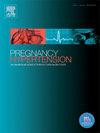Vascular dilation function correlates to pregnant outcomes in women with gestational diabetes mellitus
IF 2.9
4区 医学
Q2 OBSTETRICS & GYNECOLOGY
Pregnancy Hypertension-An International Journal of Womens Cardiovascular Health
Pub Date : 2025-08-15
DOI:10.1016/j.preghy.2025.101248
引用次数: 0
Abstract
Background
Gestational diabetes mellitus (GDM) poses significant risks to maternal and fetal health, necessitating a deeper understanding of its pathophysiology and interventions. Vascular endothelial dysfunction plays a crucial role in diabetic vascular complications, but its relationship with GDM outcomes remains unclear.
Study design
This study included 278 GDM patients categorized into high and low flow-mediated dilation (FMD) groups based on median FMD values. Clinical data, glycemic parameters, and serum biomarkers were assessed. Pregnancy outcomes were compared between groups, and logistic regression analysis was performed to evaluate associations.
Results
While demographic characteristics did not significantly differ between FMD groups, glycemic parameters were significantly better in the high FMD group. Negative correlations were observed between FMD and glycemic parameters. Patients with low FMD had higher rates of adverse pregnancy outcomes. A combined test model incorporating FMD, endothelin-1, and nitric oxide levels showed superior predictive accuracy for poor pregnancy outcomes. Vascular endothelial dysfunction, as indicated by impaired FMD, correlates with adverse pregnancy outcomes in GDM.
Conclusion
Multi-marker approaches may enhance risk stratification and personalized management strategies.
妊娠期糖尿病患者血管扩张功能与妊娠结局相关
背景妊娠期糖尿病(GDM)对母胎健康构成重大威胁,需要对其病理生理学和干预措施进行更深入的了解。血管内皮功能障碍在糖尿病血管并发症中起着至关重要的作用,但其与GDM结局的关系尚不清楚。研究设计:本研究纳入278例GDM患者,根据FMD中位数分为高、低两组。评估临床数据、血糖参数和血清生物标志物。比较两组之间的妊娠结局,并进行logistic回归分析以评估相关性。结果FMD组与FMD组的人口学特征无显著差异,但高FMD组血糖指标明显改善。FMD与血糖指标呈负相关。FMD低的患者有较高的不良妊娠结局发生率。结合FMD、内皮素-1和一氧化氮水平的联合测试模型显示出对不良妊娠结局的更高预测准确性。血管内皮功能障碍,如FMD受损所示,与GDM的不良妊娠结局相关。结论多指标方法可提高风险分层和个性化管理策略。
本文章由计算机程序翻译,如有差异,请以英文原文为准。
求助全文
约1分钟内获得全文
求助全文
来源期刊

Pregnancy Hypertension-An International Journal of Womens Cardiovascular Health
OBSTETRICS & GYNECOLOGYPERIPHERAL VASCULAR-PERIPHERAL VASCULAR DISEASE
CiteScore
4.90
自引率
0.00%
发文量
127
期刊介绍:
Pregnancy Hypertension: An International Journal of Women''s Cardiovascular Health aims to stimulate research in the field of hypertension in pregnancy, disseminate the useful results of such research, and advance education in the field.
We publish articles pertaining to human and animal blood pressure during gestation, hypertension during gestation including physiology of circulatory control, pathophysiology, methodology, therapy or any other material relevant to the relationship between elevated blood pressure and pregnancy. The subtitle reflects the wider aspects of studying hypertension in pregnancy thus we also publish articles on in utero programming, nutrition, long term effects of hypertension in pregnancy on cardiovascular health and other research that helps our understanding of the etiology or consequences of hypertension in pregnancy. Case reports are not published unless of exceptional/outstanding importance to the field.
 求助内容:
求助内容: 应助结果提醒方式:
应助结果提醒方式:


